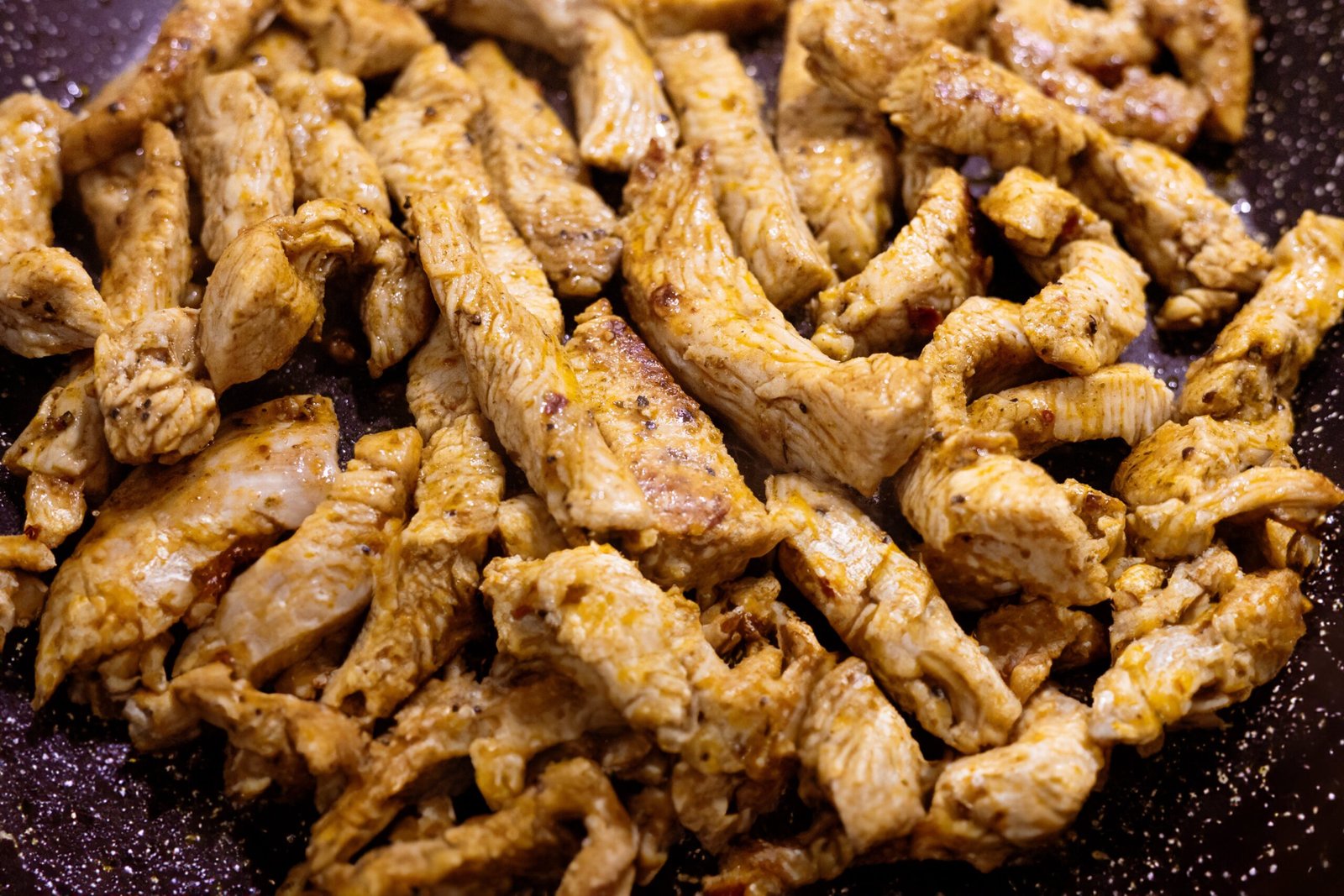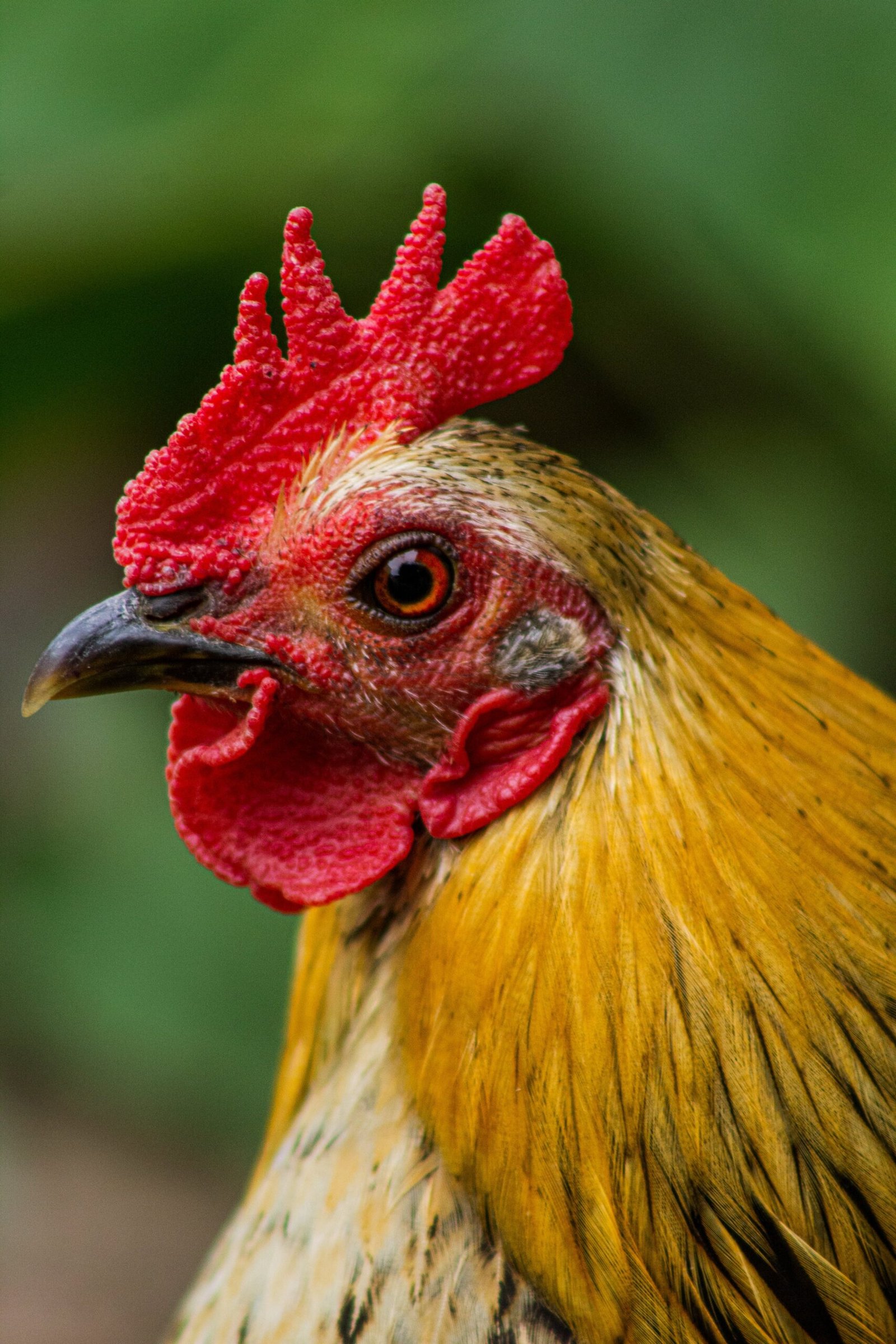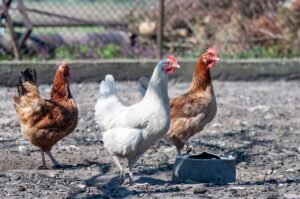
If you’re a chicken owner or just curious about safeguarding our feathered friends, you might be wondering about the most effective methods to shield them from bacterial infections. With their vulnerable immune systems, chickens are especially susceptible to these types of infections, making prevention essential. In this article, we’ll explore various strategies that can be employed to protect chickens from bacterial infections, ensuring their health and well-being. So, whether you’re a seasoned chicken keeper or contemplating becoming one, read on to discover the best ways to keep your flock healthy and disease-free.

Maintain Clean and Sanitary Conditions
Regularly Clean and Disinfect the Coop
To protect your chickens from bacterial infections, it is crucial to maintain clean and sanitary conditions in their coop. Regularly cleaning and disinfecting the coop helps eliminate any bacteria or pathogens that may be present. Remove any debris, such as feathers or droppings, from the coop floor and nesting boxes. Use a mild detergent or disinfectant specifically designed for poultry to thoroughly clean all surfaces and equipment. By keeping the coop clean, you can minimize the risk of bacterial growth and promote the overall health of your chickens.
Provide Adequate Ventilation
Adequate ventilation is essential for maintaining a healthy and sanitary environment for your chickens. Good airflow helps remove any excess moisture or ammonia fumes that can build up in the coop, reducing the risk of respiratory issues and bacterial growth. Ensure that your coop has proper ventilation openings such as windows or vents. However, be cautious not to create drafts that can lead to temperature fluctuations, as this can also stress the chickens. By providing sufficient ventilation, you can improve the air quality in the coop and minimize the chances of bacterial infections.
Keep the Coop Dry
A dry coop is essential for preventing bacterial growth and maintaining the overall health of your flock. Excess moisture in the coop can create a breeding ground for bacteria and fungi, increasing the risk of bacterial infections. Regularly check for leaks or moisture sources in the coop, and promptly address them. Install proper roof drainage systems and ensure that the coop is secure from rainfall or other sources of moisture. By keeping the coop dry, you can create a less favorable environment for bacteria to thrive, thus protecting your chickens.
Remove Wet Bedding and Manure Regularly
Proper waste management is vital to prevent bacterial infections in chickens. Wet bedding and accumulated manure can harbor bacteria and contribute to the spread of diseases. It is essential to remove wet bedding and clean out the coop regularly. Replace damp bedding with fresh, clean material to maintain a dry and hygienic environment. Likewise, remove and dispose of the manure properly to minimize the risk of bacterial contamination. By practicing regular cleaning and waste management, you can significantly reduce the chances of bacterial infections in your flock.
Implement Effective Biosecurity Measures
Limit Visitors to the Coop
Limiting visitors to the coop is an important biosecurity measure to prevent the introduction and spread of bacteria. Visitors can unknowingly bring in bacteria on their clothing, shoes, or equipment, potentially exposing your chickens to infections. Restrict access to only essential individuals, such as yourself and farm staff, who follow proper hygiene practices. Communicate the importance of biosecurity to visitors and enforce handwashing and footwear disinfection protocols. By limiting coop visitors and ensuring their compliance with biosecurity measures, you can minimize the risk of bacterial contamination.
Isolate New Birds
When introducing new birds to your flock, it is crucial to isolate them initially to prevent the potential spread of bacterial infections. Isolating new birds for a quarantine period allows you to closely monitor their health and ensure they are not carrying any contagious diseases. Provide separate housing and keep new birds away from the main flock, ideally for at least two to three weeks. During this period, observe the new birds for any signs of illness or abnormal behavior. By implementing proper isolation practices, you can protect your existing flock and prevent the introduction of bacterial infections.
Quarantine Sick or Injured Chickens
In the event of a sick or injured chicken, it is important to quarantine them from the rest of the flock. Sick or injured chickens are more susceptible to bacterial infections and can potentially transmit those infections to others. Provide a separate enclosure or isolated area within the coop for the affected chicken. This will help minimize the spread of bacteria and allow you to provide specific care and treatment. Be sure to follow biosecurity protocols when handling and caring for the quarantined chicken to avoid cross-contamination. By quarantining sick or injured chickens, you can protect the overall health of your flock.
Avoid Sharing Equipment with Other Farms
Sharing equipment between different farms can introduce bacteria from one flock to another, increasing the risk of infections. It is important to avoid sharing equipment, such as feeders, waterers, or tools, with other poultry operations. If sharing cannot be avoided, thoroughly clean and disinfect the equipment before bringing it into your coop. Ensure that the disinfectant used is effective against the specific bacteria of concern. By avoiding the sharing of equipment and practicing proper disinfection, you can reduce the potential transmission of bacterial infections.

Ensure Proper Nutrition and Hydration
Provide a Balanced Diet
Providing your chickens with a balanced and nutritious diet is vital for maintaining their immune system and overall health. A well-balanced diet ensures that chickens receive all the necessary vitamins, minerals, and nutrients to support their immune function. Consult with a poultry nutritionist to formulate a feed ration that meets the specific nutritional requirements of your flock. Avoid feeding your chickens contaminated or spoiled food, as this can introduce harmful bacteria into their system. By ensuring proper nutrition, you can enhance your chickens’ ability to fight off bacterial infections.
Offer Clean and Fresh Water
Clean and fresh water is essential for the well-being of your chickens and plays a critical role in preventing bacterial infections. Ensure that your chickens have access to clean water at all times. Regularly check and clean water containers to remove any debris, algae, or bacteria buildup. Consider providing multiple water sources to prevent overcrowding and contamination. By offering clean and fresh water, you can promote hydration and help your chickens maintain a strong immune system.
Avoid Overcrowding
Overcrowding in the coop can lead to stress, increased exposure to pathogens, and a higher risk of bacterial infections. Provide enough space for each chicken to move, roost, and have access to food and water comfortably. Overcrowding can create an environment that is conducive to the spread of bacteria and diseases. Monitor the flock size and adjust the number of chickens accordingly to maintain a suitable population density. By avoiding overcrowding, you can reduce the stress levels in your flock and minimize the likelihood of bacterial infections.
Avoid Feeding Contaminated or Spoiled Food
Feeding contaminated or spoiled food to your chickens can introduce harmful bacteria into their digestive system, increasing the risk of bacterial infections. Ensure that the feed you provide is free from contaminants, such as mold, toxins, or foreign objects. Properly store and handle the feed to prevent contamination. Regularly inspect the feed for any signs of spoilage or pests. If you suspect any issues with the feed, discard it immediately and replace it with fresh, uncontaminated feed. By avoiding contaminated or spoiled food, you can protect your chickens from bacterial infections.
Monitor and Manage Stress Levels
Maintain a Consistent Routine
Maintaining a consistent daily routine for your flock can help reduce stress levels and promote their overall well-being. Chickens thrive in a predictable environment, and sudden changes or disruptions can lead to stress and increased susceptibility to bacterial infections. Establish a routine time for feeding, watering, and egg collection. Minimize unnecessary disturbances to the coop environment and maintain a calm atmosphere. By providing a consistent routine, you can help reduce stress and support your chickens’ immune system.
Reduce Environmental Stressors
Reducing environmental stressors in the coop can contribute to a healthier and more resilient flock. Environmental stressors, such as excessive noise, bright lights, or extreme temperature fluctuations, can weaken chickens’ immune systems and make them more susceptible to bacterial infections. Ensure that the coop is well-insulated and provides adequate shade and protection from harsh weather conditions. Create a quiet and calm environment for your chickens, minimizing loud noises or sudden disturbances. By reducing environmental stressors, you can help maintain a stress-free and healthier flock.
Handle Chickens Gently and Minimize Fear
Proper handling and gentle treatment of your chickens can significantly reduce their stress levels and lower the risk of bacterial infections. Avoid rough handling, chasing, or any actions that may cause fear or distress. Train farm staff on proper chicken handling techniques, emphasizing the importance of gentle and calm interactions. Minimize any unnecessary contact or disturbances, allowing chickens to feel safe and secure. By handling chickens gently and minimizing fear, you can help maintain their overall well-being and immune function.
Prevent Overheating or Extreme Temperature Changes
Extreme temperatures, whether heat or cold, can stress chickens and compromise their immune system, making them more susceptible to bacterial infections. Provide appropriate ventilation and shade to prevent overheating during hot weather. Likewise, insulate the coop and provide adequate bedding to keep chickens warm during colder months. Monitor the temperature regularly and make necessary adjustments to maintain a comfortable environment for your flock. By preventing overheating or extreme temperature changes, you can reduce stress levels and protect your chickens from bacterial infections.

Vaccinate Chickens
Consult with a Veterinarian for Vaccine Recommendations
Vaccination is an effective method to protect chickens from specific bacterial infections. Consult with a veterinarian, preferably one with expertise in poultry, to determine the appropriate vaccines for your flock. The veterinarian can assess the local disease risks and recommend the most suitable vaccination program to provide optimal protection. By seeking professional advice, you can ensure that your chickens receive the necessary vaccinations to guard against common bacterial infections.
Follow the Recommended Vaccine Schedule
Once you have determined the appropriate vaccines for your chickens, it is crucial to follow the recommended vaccine schedule. Vaccines may require multiple doses or booster shots to provide long-lasting immunity. Adhere to the recommended timing between vaccinations as specified by the manufacturer or veterinarian. Keep accurate records of the vaccination dates and types administered to each chicken. By following the recommended vaccine schedule, you can ensure that your chickens receive the full benefits of immunization against bacterial infections.
Store and Administer Vaccines Properly
Proper storage and administration of vaccines are critical to maintain their effectiveness. Follow the manufacturer’s instructions on vaccine storage temperature, as some vaccines require refrigeration. Improper storage can render the vaccine ineffective and compromise its ability to protect against bacterial infections. Additionally, use the correct administration technique, such as subcutaneous or intramuscular injection, as directed by the manufacturer or veterinarian. By storing and administering vaccines properly, you can maximize their potency and ensure optimal protection for your flock.
Monitor for Any Adverse Reactions
While vaccines are generally safe, some chickens may experience adverse reactions. Monitor your chickens closely after vaccination for any signs of allergic reactions, such as swelling, difficulty breathing, or abnormal behavior. In rare cases, some vaccines may cause adverse effects in certain individuals. If you notice any concerning symptoms, consult your veterinarian immediately. By monitoring for adverse reactions, you can promptly address any potential issues and safeguard the health of your flock.
Practice Proper Handling and Hygiene
Wash Hands Before and After Handling Chickens
Practicing proper hand hygiene is crucial to prevent the transmission of bacteria between humans and chickens. Wash your hands thoroughly with soap and water before and after handling your chickens, their eggs, or any equipment used in the coop. Handwashing helps remove any bacteria or pathogens that may be present on your hands, reducing the risk of contamination. Use disposable paper towels or hand dryers instead of shared cloth towels to avoid cross-contamination. By maintaining good hand hygiene, you can minimize the transfer of bacteria and protect the health of your flock.
Use Proper Personal Protective Equipment (PPE)
Using proper personal protective equipment (PPE) when handling chickens can provide an additional layer of protection against bacterial infections. Consider wearing disposable gloves, coveralls, or aprons to prevent direct contact with droppings or contaminated surfaces. PPE can help reduce the risk of bacterial transmission from chickens to humans and vice versa. Make sure to properly dispose of used gloves or PPE to avoid cross-contamination. By using appropriate PPE, you can protect yourself and minimize the potential spread of bacteria.
Avoid Contact with Wild Birds or Contaminated Surfaces
Wild birds can carry various bacteria and diseases that can be transmitted to your chickens. Avoid direct contact or proximity to wild birds, especially in areas where bacterial infections are prevalent. Additionally, avoid contact with contaminated surfaces or areas where bacteria may be present, such as manure piles. Minimize the risk of cross-contamination by practicing proper biosecurity measures and limiting exposure to potential sources of bacterial infections. By avoiding contact with wild birds and contaminated surfaces, you can reduce the risk of introducing bacteria into your flock.
Promptly Clean and Sanitize Equipment
Regularly cleaning and sanitizing equipment used in the coop is essential to prevent the spread of bacteria. Equipment, such as feeders, waterers, and tools, can become contaminated with feces, bacteria, or other pathogens. Promptly clean and sanitize these items after use, ideally with a detergent or disinfectant formulated for poultry use. Pay extra attention to areas that may come into direct contact with chickens or their waste. By maintaining clean and sanitized equipment, you can minimize the risk of bacterial contamination and maintain a healthy environment for your flock.
Monitor and Identify Early Signs of Infection
Frequent Health Checks and Observations
Regular health checks and observations are key to detecting any early signs of bacterial infection in your chickens. Set aside time to visually inspect each chicken, looking for any abnormalities or changes in behavior. Monitor their appetite, water consumption, and overall appearance. This will help you identify potential health issues early on and take appropriate action. By conducting frequent health checks and observations, you can promptly address any signs of infection and prevent further spread within the flock.
Look for Symptoms like Diarrhea, Respiratory Issues, or Abnormal Behaviors
When monitoring your flock, be vigilant for common symptoms that may indicate a bacterial infection. Symptoms such as diarrhea, respiratory issues (coughing, sneezing, wheezing), decreased activity, or abnormal behaviors should trigger concern. Other noticeable signs may include reduced appetite, weight loss, feather abnormalities, or changes in egg production. If you observe any of these symptoms, it is crucial to isolate and seek immediate veterinary attention for the affected chicken. By recognizing and responding to early signs of infection, you can prevent the spread of bacteria and protect the overall health of your flock.
Isolate and Treat Infected Chickens Immediately
If you suspect that a chicken is infected with a bacterial infection, it is imperative to isolate them from the rest of the flock immediately. Isolation can prevent the potential transmission of bacteria to other healthy chickens and allow for focused treatment. Provide a separate enclosure or area within the coop for the infected chicken, ensuring they have access to food, water, and appropriate shelter. Consult with a veterinarian to determine the best course of treatment and follow their instructions accordingly. By isolating and treating infected chickens promptly, you can prevent the spread of bacteria and support their recovery.
Consult a Veterinarian for Diagnostic Testing
In cases where bacterial infections are suspected but not conclusively diagnosed, it is advisable to consult a veterinarian for further diagnostic testing. A veterinarian can perform tests, such as bacterial cultures or bloodwork, to identify the specific bacteria causing the infection. This information is crucial in determining the most effective treatment options and preventing the misuse of antibiotics. By seeking veterinary guidance and diagnostic testing, you can obtain accurate information about the bacterial infection and develop an appropriate treatment plan.
Use Antibiotics Judiciously
Seek Veterinary Guidance for Antibiotic Use
Antibiotics should only be used under the guidance and prescription of a veterinarian. Antibiotics are valuable tools in treating bacterial infections, but their misuse can lead to antibiotic resistance and compromise the effectiveness of future treatments. If you suspect a bacterial infection in your chickens, consult with a veterinarian for proper diagnosis and treatment recommendations. The veterinarian will assess the situation, prescribe the appropriate antibiotic if necessary, and provide dosing instructions.
Follow Dosage and Treatment Duration Instructions
When administering antibiotics to your chickens, it is crucial to follow the dosage and treatment duration instructions provided by the veterinarian. Completing the full prescribed course of antibiotics is essential to eliminate the bacteria completely. Prematurely stopping antibiotic treatment can contribute to the development of antibiotic-resistant bacteria. Adhere to the recommended dosage, schedule, and duration to maximize the effectiveness of the treatment and minimize the risk of resistance.
Avoid Routine Antibiotic Use
Avoid the routine or prophylactic use of antibiotics in your flock. Routine antibiotic use without a justified reason can contribute to the emergence of antibiotic-resistant bacteria. Only administer antibiotics when necessary and under veterinary guidance. It is essential to conduct proper diagnostic testing to identify the bacteria causing the infection and determine the most suitable treatment approach. By avoiding routine antibiotic use, you can help preserve the effectiveness of these crucial medications and protect both your flock and public health.
Prevent Antibiotic Resistance
To prevent antibiotic resistance, it is important to use antibiotics judiciously and responsibly. Avoid using antibiotics that are critically important for human medicine in poultry production unless specifically directed by a veterinarian. Practice good biosecurity measures, maintain clean and sanitary conditions, and implement effective disease prevention strategies to minimize the need for antibiotic treatment. By reducing the reliance on antibiotics and employing alternative disease control methods, you can contribute to the prevention of antibiotic resistance and help safeguard the effectiveness of these important medications.
Practice Pest Control Measures
Regularly Inspect and Treat for External Parasites
External parasites, such as mites or lice, can weaken chickens and make them more susceptible to bacterial infections. Regularly inspect your chickens for any signs of infestation, such as feather loss, irritation, or scratching. Treat affected chickens promptly with appropriate parasiticides as recommended by a veterinarian. Additionally, maintain a clean coop environment, regularly clean nesting boxes, and keep bedding materials dry to minimize external parasite populations. By practicing effective pest control measures, you can reduce the risk of bacterial infections and maintain the health and comfort of your flock.
Implement Effective Rodent Control
Rodents not only consume chicken feed but can also carry and transmit bacteria, potentially contaminating the coop and increasing the risk of bacterial infections. Implement effective rodent control measures to prevent infestations. Seal any cracks or openings in the coop that may serve as entry points for rodents. Regularly inspect and clean storage areas to eliminate potential food sources and nesting sites for rodents. Consider using traps or rodenticides to manage existing populations. By implementing proper rodent control measures, you can reduce the risk of bacterial contamination and protect your flock.
Protect Feed Storage Areas from Contamination
Feed storage areas can be a potential source of bacterial contamination if not properly managed. Protect your feed storage areas by storing feed in sealed containers or bins to prevent access by pests or moisture. Regularly inspect the storage area for any signs of pests or spoilage and promptly address any issues. Keep the area clean and well-maintained. Consider implementing a first-in, first-out (FIFO) system to ensure older feed does not spoil or become contaminated. By safeguarding feed storage areas, you can reduce the risk of introducing bacteria into your flock.
Minimize Standing Water or Moist Areas
Standing water or moist areas in and around the coop can attract pests, contribute to bacterial growth, and increase the risk of infections. Regularly inspect the coop and surrounding areas for any sources of standing water, such as leaks or poor drainage. Address any issues promptly by fixing leaks or improving drainage systems. Minimize the presence of moist areas by ensuring proper ventilation and preventing water accumulation. By minimizing standing water or moist areas, you can reduce the growth of bacteria and create a healthier environment for your chickens.
Educate and Train Farm Staff
Provide Proper Training on Biosecurity Measures
Properly educating and training your farm staff is essential to ensure that everyone understands and implements important biosecurity measures. Train your staff on the potential risks associated with bacterial infections and the importance of preventing their spread. Teach them about proper hand hygiene, use of personal protective equipment, and equipment sanitation protocols. Emphasize the significance of limiting visitor access, isolation of new birds, and quarantine procedures. By providing comprehensive training, you can foster a culture of biosecurity awareness and responsibility among your farm staff.
Teach Staff about Disease Recognition and Prevention
A well-informed staff that can recognize the signs of bacterial infections and understands prevention strategies is crucial in protecting your flock. Educate your farm staff about common bacterial infections in chickens, their symptoms, and the appropriate response procedures. Teach them how to properly monitor the flock’s health, conduct routine checks, and identify abnormal behaviors or symptoms that may indicate bacterial infections. By equipping your staff with the necessary knowledge and skills, you can enhance the overall disease recognition and prevention efforts.
Promote Good Hygiene Practices
Promoting good hygiene practices among your farm staff is vital for maintaining a healthy environment for your chickens. Emphasize the importance of proper hand hygiene, including thorough handwashing before and after handling chickens. Encourage staff to use personal protective equipment, such as gloves or coveralls, when necessary. Train them on the proper sanitation of equipment and disinfection protocols. By promoting good hygiene practices, you can minimize the introduction and spread of bacteria in the coop environment.
Implement Protocols for Sick or Injured Chickens
Establish clear protocols for handling sick or injured chickens to ensure that they receive the appropriate care while minimizing the risk of bacterial contamination. Train your staff on how to properly isolate and quarantine affected chickens. Instruct them on specific treatment procedures and the use of antibiotics, if necessary. Emphasize the importance of regular monitoring and prompt veterinary consultation for accurate diagnosis and treatment. By implementing protocols for sick or injured chickens, you can streamline the response process and protect the health of your flock.
In conclusion, protecting chickens from bacterial infections requires a comprehensive approach that encompasses good husbandry practices, effective biosecurity measures, proper nutrition, and vigilant monitoring. Regularly clean and disinfect the coop, provide adequate ventilation, and keep the environment dry to prevent bacterial growth. Implement biosecurity measures such as limiting visitors, isolating new birds, and quarantining sick or injured chickens to minimize the risk of bacterial transmission. Ensure proper nutrition and hydration by offering a balanced diet and clean, fresh water. Monitor and manage stress levels, vaccinate chickens as recommended, and practice proper handling and hygiene. Be vigilant in monitoring and early identification of infection signs, use antibiotics judiciously, and employ pest control measures. Finally, educate and train farm staff to understand and implement biosecurity measures, disease recognition, and prevention strategies. By following these guidelines, you can help protect your flock from bacterial infections and promote their overall health and well-being.







